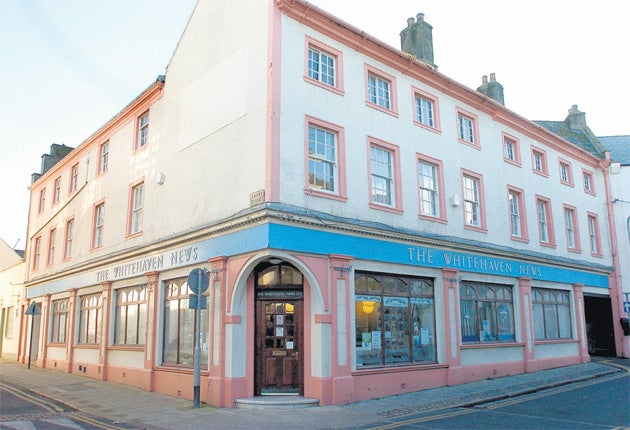How a Whitehaven newspaper led the world's media for a day
As Derrick Bird murdered 12 people, local journalists got the story. Matthew Bell reports

When Michael Moon, proprietor of Whitehaven's eponymous antiquarian bookshop, heard there had been a fatal shooting in Duke Street, he did what community-minded citizens have instinctively always done, and called the local paper. Two streets away, in the pink-stuccoed offices of The Whitehaven News, editor Colin Edgar and his staff were putting the news for that week's issue on page, Wednesday being press day.
After Mr Moon's call came through, two reporters were dispatched to the crime scene, which police were already sealing off. Derrick Bird, the taxi-driver who would go on to kill 11 more victims, was still at large, and the reporters were sent back by police as the town went into lockdown.
Over the coming hours, The Whitehaven News would become central to a breaking news story, as members of the national and international media descended on Whitehaven to piece together the events of a day unlike any other the town had ever experienced. The paper's website, which normally draws about 800 hits an hour, was soon experiencing 18,000.
Over in Carlisle at the offices of its sister title, the News & Star, a daily title also part of the family-owned Cumbria News Group, the IT department were fighting to cope with the surge in demand, with the site collapsing a number of times under the weight of traffic. A quick decision was made to extend the website's bandwidth to meet demand.
And it was not just journalists who turned to the local press to find out what was happening: over the next few days, friends and relatives of the victims would flood the site, leaving messages of support for one another on the swiftly created online Condolences Book.
The staff of The Whitehaven News, a weekly broadsheet, have been at pains not to seem to captialise on Wednesday's events. "There are no 'exclusives' at a time like this," says Alan Cleaver, the newspaper's deputy editor. "As with all tragedies like this, reporters and police help each other. You just work together and hopefully report fairly and accurately on what happened."
And yet the surge highlights the value of a local news organisation rooted at the heart of a community. The BBC's earliest reports were broadcast out of Newcastle, while Sky News was left scrambling and failed to get a reporter on the scene until the afternoon. Over the coming days national newspapers, including The Independent, Daily Mail, The Daily Telegraph and The Guardian, would credit the local newspaper and website in their reports.
The Whitehaven News, along with all titles in the Cumbrian News Group, has in recent years invested in its online presence, and built up a strong social media network using some innovative techniques: a reward scheme set up earlier this year gives Facebook friends of the paper free advertising opportunities. Journalists last week used Facebook and Twitter to disperse information as soon as it was gathered. "The priority has been trying to get accurate information," explains Cleaver, "The reporters here have worked every minute of every day to check and double-check with their contacts. It's all on a scale we have never had to deal with before."
With any major news story, the local press will by definition have a headstart, but in Cumbria it is especially strong because of the county's extreme topology. "It's always a shock to people how big Cumbria is when they come up here," says Michael Glover, a local journalist and former editor of The Westmorland Gazette. "Because of the mountains and lakes, communities are more isolated and have very strong loyalties to whichever of the county's 15 newspapers covers their patch."
The nationwide decline in local newspaper readership has been felt here, and in 2008 the Cumbria News Group made 40 staff members redundant. But the decline is less acute here than elsewhere, with The Whitehaven News posting a 4.6 per cent decline in year-on-year circulation – to 15,450 – compared to the average for regional weeklies of 5.8 per cent.
The press continues to thrive in Cumbria, and it's thanks to this that Michael Moon's first instinct was to call The Whitehaven News on hearing of the shooting. Within hours, the world's media had arrived and the story was out of their hands.
Within a few weeks, once the world's media has moved on, the people of Whitehaven will return to whatever normality there can be, and the circulation of The Whitehaven News will go back to normal levels. The events of last week will leave an indelible mark on the town's history. But the importance of local journalists – to obtain and verify the facts as quickly as possible – has, at least, been proved once again
Join our commenting forum
Join thought-provoking conversations, follow other Independent readers and see their replies
Comments